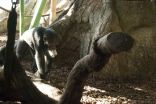Chimpanzees will travel for preferred foods, innovate solutions
Study at Lincoln Park Zoo reveals chimpanzee determination and innovation
2015-03-17
(Press-News.org) (Chicago) - Just as humans will travel to their favorite restaurant, chimpanzees will travel a farther distance for preferred food sources in non-wild habitats, according to a new study from scientists at Chicago's Lincoln Park Zoo that publishes on March 17 in the journal PeerJ.
Chimpanzees at Lincoln Park Zoo prefer grapes over carrots. Previous research at the zoo provided that insight into food preferences. Now, a 15-month study, led by Lydia Hopper, PhD of the Lester Fisher Center for the Study and Conservation of Apes at Lincoln Park Zoo, suggests that the apes are willing to travel further to get the goodies they prefer. This is the first study of its kind in a zoo setting, and the results compare nicely to similar research on wild chimpanzees.
In order to receive a food reward, the chimpanzees had to collect tokens, or small lengths of PVC pipe, from a single location. The chimpanzees could then exchange the tokens with researchers at one of two locations - a close location with a carrot reward or a far location(s) with a grape reward. By the third phase (30 sessions per phase), as a group, the chimpanzees preferred to travel further in order to get the better food item (grapes).
"It was quite fascinating to see the developments between each of the three phases of the token exchange study," said Hopper. "In addition to learning about food preferences and proximity, we also observed innovative, problem-solving behavior among the chimpanzees."
Interestingly, the first chimpanzee to discover the better reward being offered at the far location was a female named Chuckie, who is the lowest-status female in the group. The far location may have been preferred for not only it's food reward, but because it gave her an opportunity to avoid competition from higher-status chimpanzees at the close location. Additionally, alpha male chimpanzee, Hank, observed the other apes and learned the benefits of the far location, thus exchanging 100 percent of his tokens at the far, preferred food location.
"All of the chimpanzees in this study demonstrated flexible foraging strategies with minimal scrounging from one another," said Hopper. "Understanding the animals' preferences and exploration of their habitat is critical to caring for these animals."
INFORMATION:
Media Contacts:
Sharon Dewar
(312)742-2246
SDewar@lpzoo.org
Jillian Braun
(312) 742-5791
JBraun@lpzoo.org
ABOUT LINCOLN PARK ZOO
Lincoln Park Zoo, a historic Chicago landmark founded in 1868, is dedicated to connecting people with nature by providing a free, family-oriented wildlife experience. A leader in conservation science both globally and locally, the zoo exemplifies the highest quality animal care and educational outreach. The not-for-profit zoo, managed by The Lincoln Park Zoological Society, is a member-supported organization and one of the nation's only free, privately managed zoos. For more information, call 312 -742-2000 or visit http://www.lpzoo.org.
[Attachments] See images for this press release:

ELSE PRESS RELEASES FROM THIS DATE:
2015-03-17
Toronto, ON (March 17, 2015) - A comprehensive study examining clinical trials of more than 95,000 patients has found that glucose or sugar-lowering medications prescribed to patients with diabetes may pose an increased risk for the development of heart failure in these patients.
"Patients randomized to new or more intensive blood sugar-lowering drugs or strategies to manage diabetes showed an overall 14 per cent increased risk for heart failure," says Dr. Jacob Udell, the study's principal investigator, and cardiologist at the Peter Munk Cardiac Centre, University Health ...
2015-03-16
A new study, "Global Dispersion and Local Diversification of the Methane Seep Microbiome," provides evidence methane seeps are habitats that harbor distinct microbial communities unique from other seafloor ecosystems. The article appeared in the March 16 issue of the Proceedings of the National Academy of Sciences (PNAS).
Methane seeps are natural gas leaks in the sea floor that emit methane into the water. Microorganisms that live on or near these seeps can use the methane as a food source, preventing the gas from collecting in the surrounding hydrosphere or migrating ...
2015-03-16
If you want someone to open up to you, just make them laugh. Sharing a few good giggles and chuckles makes people more willing to tell others something personal about themselves, without even necessarily being aware that they are doing so. These are among the findings of a study led by Alan Gray of University College London in the UK, published in Springer's journal Human Nature.
The act of verbally opening up to someone is a crucial building block that helps to form new relationships and intensify social bonds. Such self-disclosure can be of a highly sensitive nature ...
2015-03-16
Charles R. Wira, PhD, and colleagues at Dartmouth's Geisel School of Medicine have presented a comprehensive review of the role of sex hormones in the geography of the female reproductive tract and evidence supporting a "window of vulnerability" to HIV and other sexually transmitted infections (STIs). Published in Nature Reviews in Immunology, Wira's team presents a body of work that National Institutes of Health evaluators called, "a sea change" for research in the female reproductive tract (FRT).
"The FRT is tremendously complex and the normal changes that occur to ...
2015-03-16
The studies below will be presented at the American College of Cardiology's 64th Annual Scientific Session on Monday, March 16.
1. New Insights on Endurance Sports and Atrial Fibrillation
Previous studies have suggested endurance athletes may face a slightly higher risk of developing atrial fibrillation, a condition in which the heartbeat becomes irregular or rapid. A new study shows that among runners, the total number of years a person has been running is the factor most closely associated with atrial fibrillation risk, as compared to other measures of running behavior ...
2015-03-16
To pack two meters of DNA into a microscopic cell, the string of genetic information must be wound extremely carefully into chromosomes. Surprisingly the DNA's sequence causes it to be coiled and uncoiled much like a yoyo, scientists reported in Cell.
"We discovered this interesting physics of DNA that its sequence determines the flexibility and thus the stability of the DNA package inside the cell," said Gutgsell Professor of Physics Taekjip Ha, who is a member of the Carl R. Woese Institute for Genomic Biology at the University of Illinois. "This is actually very elementary ...
2015-03-16
Mayo Clinic research finds direct evidence of gadolinium deposition in neuronal tissues following intravenous administration of gadolinium-based contrast agents used in MRI exams. The findings were recently published online in the journal Radiology.
In this study, Mayo Clinic identified patients who donated their body to medical research and had undergone multiple gadolinium contrast-enhanced MRI exams during their lifetime. Brain tissue samples from these patients were then compared to donors who had never received a gadolinium contrast agent. The patients exposed to ...
2015-03-16
DURHAM, N.C. -- The warm soft folds of the intestines are teeming with thousands of species of bacteria. Collectively known as the gut microbiome, these microbes help break down food, synthesize vitamins, regulate weight and resist infection.
If they're so key to health, what factors shape an individual's gut microbial makeup?
Previous studies have pointed to the food we eat, the drugs we take, genetics, even our house dust. Now, a new study in baboons suggests that relationships may play a role, too.
The researchers studied social interactions, eating habits and ...
2015-03-16
The global human population is growing faster than the water supply. Investigators recently analyzed various models and trends to assess both optimistic and pessimistic projections of future water use and shortages.
"Historically, water supply has grown through alternating periods of rapid growth and stagnation, and we now seem to be entering a new period of stagnation while the population continues to grow," said Dr. Anthony Parolari, lead author of the WIREs Water article. "To avoid water scarcity from this point forward, the alternatives include further water supply ...
2015-03-16
Human babies appear to need more of a nutritional boost from breast-milk proteins than do infants of one of their closest primate relatives, suggests a study comparing human milk with the milk of rhesus macaque monkeys.
The research team, led by the University of California, Davis, came to this conclusion after developing a new technique for comparing the proteome -- all detectable proteins -- of human milk with the proteome of the rhesus macaque monkey.
The researchers expect the findings will provide a better understanding of human breast-milk composition and identify ...
LAST 30 PRESS RELEASES:
[Press-News.org] Chimpanzees will travel for preferred foods, innovate solutions
Study at Lincoln Park Zoo reveals chimpanzee determination and innovation



